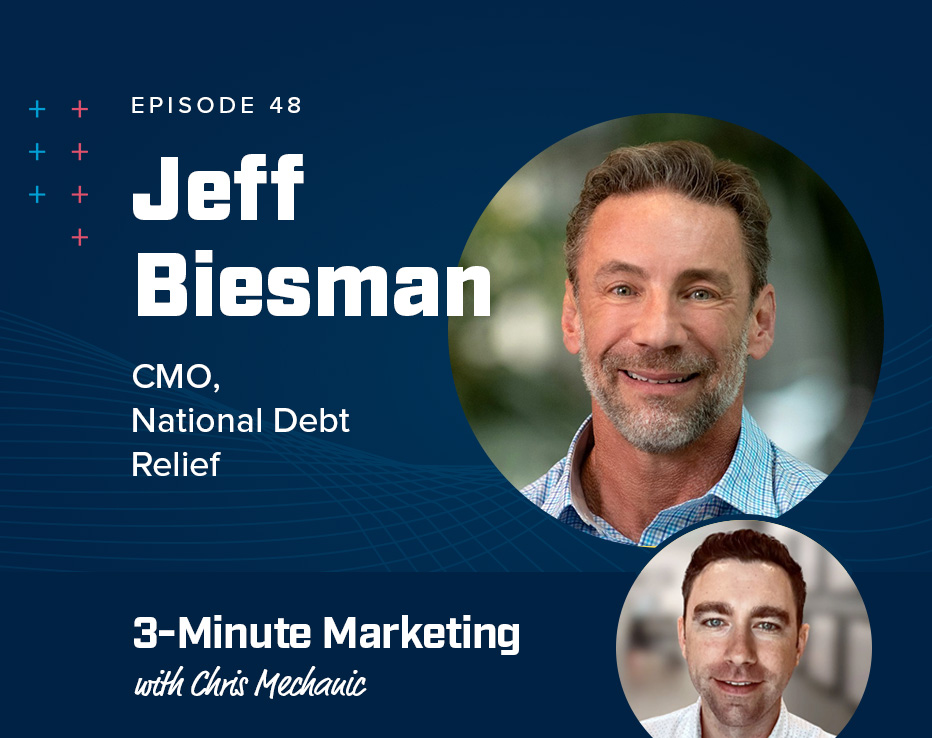Today on 3-Minute Marketing, I’ve got badass CMO Christian Campagnuolo (CMO at Revature) back for round 2! You can check out my first episode with Christian here.
Book a 30 minute call
Reserve 30 minutes with a strategist and get 30 hours worth of value.
This time, Christian shared his thoughts on a big topic for marketing leaders right now: staffing and retention. Specifically, “How do you find and keep great marketers, especially with all that’s changed in the last couple of years?”
Show notes:
- Competitive salary and benefits is still #1. But it works best when there’s a plan and strategy you can justify it against. This gives employees a clear path to progress on in your company.
- #2 is flexible work location. Post-COVID, talent is not restricted geographically anymore.
- Hire one or two people that are really good, then hire an agency to support them and turn them into badasses.
- #3 is stability. Potential hires want to know that the company will be around for a long time. While a “startup environment” seems fun, it’s also risky.
- To mitigate that risk, let your potential hires peek under the curtain at how your company is actually going to hit its goals. Also let them interview your long-time employees to understand why they’ve stayed with the company and sell the long-term vision.
- #4 is growth. Help your hires understand both how they will grow in their role and how their department will grow around them.
- According to a 2019 LinkedIn survey, 94% of respondents said they would stay at a company if it helped them learn and grow.
- Set aside a professional development budget for each employee to give them the opportunity to invest in their own growth at YOUR company… instead of somewhere else.
Transcript:
– You’re listening to “3-Minute Marketing,” where we interview the world’s top growth marketing leaders, distill their knowledge into actual bite-sized insights. Now here’s your host, Chris Mechanic.
– You’re a highly sought after individual. Ladies and gentlemen, Christian Campagnuolo, CMO of Revature, formerly EVERFI, formerly agency owner, overall badass dude.
– Thanks.
– I know that you’re a badass marketer. Staffing is a big deal right now, so I want to talk about staffing, particularly obviously as it relates to marketing and the C-suite.
– Competitive salary and benefits is number one. Comp works best when there’s a plan and there’s a strategy. And so, not only for the individual that you’re hiring, but for the organization. So, as a new CMO or as you’re coming in to an organization, you want to help them not only understand like, these are the types of people I need, but this is the path that these people are going to take. Right, so, have a plan for hiring and development. Make sure that you’re budgeting and knowing that, look, within a year, this role is going to need to get a raise, so, performance-based comp? So, flexible work location. Talent is now not restricted geographically. For example, in the D.C. area where we are, hiring digital marketing expertise, great for your agency, is really hard. So being able to go and hire from all those other places is amazing, and the flexibility is what people want now. “Can I come in a couple of days? Can I come in when it’s important? I want to work from home. That life balance is really, really important.”
– You can find some badass talent at this firm called WebMechanix if you need it.
– I know, that’s what I was saying. Really, really good for you. And I always find, my whole agency philosophy is, have one or two people internally that are really good, but have an agency to make you a badass at it. So hire an agency out in the world that’s going to bring five people to the table. So now you got a team of seven versus a team of two or a team of six versus a team of one. And that’s the way agencies need to be used. The second part is stability. You want to know that the company is stable. Everybody talks about they want to be a part of a startup environment, which is nimble, efficient, innovative, those types of things. But the startup environment doesn’t usually produce great companies. A lot of them fail. So they also want that stability. They want to know your organization’s going to make it. Open the door. Let them know what the plans are. This is how we’re planning to accomplish what we’re accomplishing. Here are our long-term goals. Here are our big account positions and how important they are. So when they are getting an understanding work that’s coming to them, they understand the stakes that are there. Go beyond the financials. Have them talk to individuals that have been there a long time. Why are they there? Or go talk to new people that have come from big places, like Accenture or other organizations that are huge that have come and work. Why are they here? Help them see the value in the stability of where you currently are. That’s three. And lastly is growth. So, goes akin with stability. Show them the path forward. Not only in their own individual career, the Holy Trinity, salary, title, responsibilities. You want to make sure that they understand of like, you’re the only person in this role right now, but this is how this department is going to grow around you. I’m hiring you as the anchor and you’re going to be a doer, but in two years, you’re going to be a manager. According to the survey in 2019 that LinkedIn did, 94% of people said that they would’ve stuck around at an organization longer if they had known that the organization was going to help them learn something or help them grow. I have a plan mapped out for every single person, every single year. They have anywhere from 500 to $1,000 a year to spend on professional development. And that does not include T&E. So for depending on what level they are, they have anywhere from 500 to 1,000 bucks to go and spend. So, it’s part of their package. Like it’s part of like, look, I want you to professionally grow. So, please tell me, what do you want to do this year? What do you want to get better at? And they tell me, okay, go and research the things that you want to do. That helps them to understand that I value your growth and I want to see you grow here. I don’t want to see you learn here and then go somewhere else to grow. So, make professional development part of your yearly budget. Make sure that they understand what that is.
– And it sounds like, if I’m going to summarize, if I had only a few words, it would be you invest a lot in the hiring process. You really think a lot of it through. You think about, how can we make these people feel safe with the stability? You think about, how can we give these people a path to growth? Both with your first step in terms of like, hey, board, we’re going to need raises for these people, as well as your fourth step, the show the growth plan.
– That’s right.
– You talk about learn and grow. So you really invest a lot into that hiring process and it sounds like put a lot of thought and effort toward it. Where I know a lot of workers are like, “Hey we need a marketing ops person because that one just quit.” And they just haphazardly just drop a job description and like cross their fingers. But I think your method
– And hope everybody approves it.
– Yeah, your method is thoughtful and specific, like both to human, I mean, basically it’s geared right at human emotions. Like right at,
– Yeah.
– Right up the four triangles of the hierarchy of needs basically.
– Yeah, Maslow’s needs. What I like to think about it is, you need to have a plan, make internal organization understand what the growth plan is for the individual and the value that they’re going to bring, and then help the individual understand what you expect of them and the value that they need to be delivering. And so, you need to talk to their head and heart. And more and more, everybody complains about millennials, but you actually need to talk to their heart more than their head. And that’s a not a dig. It just means that they’re leading more with what they believe in and their values and all of those other things, whereas, some other folks might be more money-conscious and they want to make sure that they have balance in their life and that work is a component, an integral component of the way that they live, versus a completely separate thing. Like I’m a Gen X’er. Work is bifurcated between work and life. But for a millennial, who a lot of folks that we’re hiring now, those folks, those are incorporated. They find their friends there. They find their spouses or their significant others all inside these work environments. And so, you have to speak to their head and heart and help them understand all of those types of things. And those four things will help them to do that.
– I think it will.
– Salary, flexible.
– Christian, that was fire on staff retention. We haven’t talked about Revature at all. Talk a little bit about Revature. Let people know where they can find you and also all the cool shit you guys are doing. It is really cool.
– Well, thanks. Revature is a basically a, we’re helping folks get technical careers in tech. So, software engineers is a huge dirge. There’s not a lot of software engineers out there entry level. And so we take folks right out of college with AA or BA degrees, no matter what you majored in, and we turn them into software engineers, really successful ones. I just got a note today that two of our folks, so we hire, we basically are paying them while they’re getting trained, and then we guarantee their placement. And so, they definitely will get a job in tech, and all kinds of companies, like Capital One and Peloton, Salesforce is a huge client. So, Revature.com is where.
– Well, I dig it, Christian. Thank you very much.
– All right, man.
– For your time. Yeah, and,
– Chris,
– Come back again sometime.
– Always a pleasure, man. Talk to you soon.
– All right.
– Thanks, all right, bye bye.
Featuring:

Christian CampagnuoloCMO

Chris MechanicCEO & Co-Founder
Podcasts Info:
Categories:
MarketingMost newsletters suck...
So while we technically have to call this a daily newsletter so people know what it is, it's anything but.
You won't find any 'industry standards' or 'guru best practices' here - only the real stuff that actually moves the needle.






